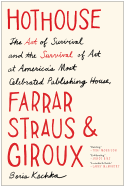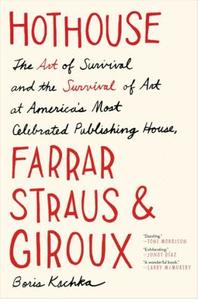

The figure that towers over the story is that of Roger W. Straus, Jr., the scion of two prominent German-Jewish families, who "could be cheap, vulgar, classist, and sexist all in one gratuitously cruel remark," all while holding himself out as an "aristocrat of taste in a mercenary meritocracy." From T.S. Eliot to Flannery O'Connor to Isaac Bashevis Singer, FSG attracted a roster of literary superstars (including 25 Nobel laureates), nurturing them both creatively and financially. For all his character flaws, recounted in exquisite detail, Straus was the force of nature who kept these writers in the FSG fold and made it the home of choice for contemporary authors like Jonathan Franzen and Jeffrey Eugenides.
Much of Hothouse chronicles the stark financial challenges that faced the house over the 58 years between its founding and Straus's death in 2004 and beyond, into the era of current publisher Jonathan Galassi. Straus's willingness to borrow against his inheritance to keep the house afloat is a recurrent theme, as was his determination not to cede control to a corporate buyer, a fate he delayed until 1994, when he finally orchestrated a sale to Germany's Verlagsgruppe Georg von Holtzbrinck (known as Macmillan Publishers in the English-speaking world).
Kachka dishes plenty of gossipy fare about the illicit couplings at 19 Union Square West, a cramped warren of offices Straus's wife, Dorothea, dismissed as a "sexual sewer," alongside stories of Straus's feuds and friendships with industry insiders. But the book is equally perceptive in describing the fraught relationship between the patriarch and his son, Roger III, or "Rog," as the latter grappled with the challenge of establishing himself in the family business.
Somehow, as Kachka describes it, over the nearly six decades Roger Straus was the dominant player at FSG, he created a culture that was "high-minded and scrappy, aggressive and refined, quintessentially American but thoroughly international." How he balanced on that high wire for so long makes a lively and entertaining story any book lover will devour with relish. --Harvey Freedenberg
Shelf Talker: Boris Kachka's lively history of publisher Farrar, Straus & Giroux will delight any book lover.

